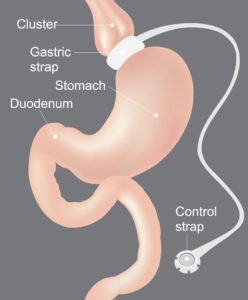 The gastric band operation is a reversible procedure that enables you to control your food intake more effectively.
The gastric band operation is a reversible procedure that enables you to control your food intake more effectively.
As the term itself says, it involves placing a band around the upper part of your stomach which limits the amount of food you can and actually want to eat.
When comparing to other bariatric procedures, getting a gastric band is far less invasive and requires far less recovery time. As with others of its kind, it allows you to more easily reach a healthier body mass.
Find out what it involves and if it’s the right option for you.
When placed on your stomach, a gastric band creates a small area into which the food initially passes. This makes the passing of food into your intestines much slower, which in turn makes you fulfill your appetite much faster. The band can be adjusted to accommodate to your weight loss.
The band will need to be regularly adjusted through the injection of a solution through an opening which is placed right under the skin during the operation. This is to not only to keep the band functioning properly but to also reduce your discomfort and to find the proper adjustment level for your weight.
Getting a gastric band is indicated for people with BMI above 30 and any conditions which would be alleviated or even cured with weight loss. People with very high BMI may not be suitable due to difficulties with adjusting the band. The solution best suited to your condition may be found with the help of a bariatric surgeon.
If regular options such as diet and exercise have not helped you reach a healthier weight, this procedure may help you. The procedure is only recommended to people between the ages of 15 and 65 and without alcohol or drug dependencies.
- Operation time: ~1 hour
- Hospital stay: 1 day
- Recovery time: 3 to 4 weeks
- Work leave required: 1 week
While there are risks and complications involved just like with other bariatric procedures, the application of the band can be done laparoscopically, which involves minimal incisions. This in turn allows you to recover much faster.
A liquid diet is required for the first few days after the surgery. Semi-liquid and softer foods may be ingested after about 3 days. In 3 to 4 weeks, you may resume eating hard foods but at far lesser amounts in order to avoid discomfort and enabling you to lose weight. The gastric band does not interfere with the work of your intestines which means you do not need to take vitamin and mineral supplements after the procedure.
However, lower quality foods and excessive amounts will cause greater discomfort and can lead to sickness. While this may seem as a disadvantage, it will enable you to be more mindful of what and how much you eat. You will find that a healthy diet will cause fewer problems and make you feel better in general.
Before any bariatric procedure is taken, it is a required standard that all patients get to sit down with the surgeon and discuss their options. None of the procedures are an easy way out and must be chosen carefully.
The surgeon can help you find the option that would work best with your lifestyle, prior conditions and weight loss goal. The gastric band enables you to lose weight at a slower pace and in smaller amounts, which may be recommended for your condition.
After the operation, you will be given full instructions on your new diet and what to expect next. Modern bariatric clinics have specialised nurses who can offer further support. Information will be given on how often to eat, what to eat and how to best avoid discomfort. With the gastric band, you will need regular visits to the surgeon to make any required adjustments to it.
While different bariatric procedures carry risks, they can greatly improve a person’s general well-being and push them to adopt a better lifestyle. Getting a gastric band is only an option when others such as diets and exercise have already been tested. Comorbid conditions such as diabetes, arthritis, chronic fatigue, depression, etc. can make regular options all the more difficult.
Gastric band avoids some complications such as dietary deficiencies and irreversibility that are apparent with other bariatric procedures. It will require some maintaining and does not provide as rapid a weight loss. Consult your bariatric surgeon of choice to find out if this option is the best for you.
 The gastric band operation is a reversible procedure that enables you to control your food intake more effectively.
The gastric band operation is a reversible procedure that enables you to control your food intake more effectively.




